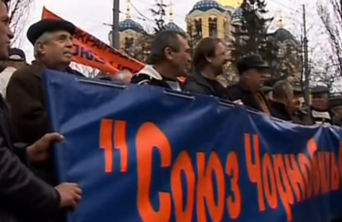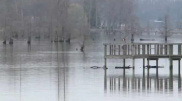25 Years Later, Funding Issues Plague Chernobyl's Recovery Efforts
Russian and Ukrainian leaders met at the decommissioned Chernobyl power plant today to honor the 25th anniversary of its nuclear disaster.
According to UPI, Russian President Dmitry Medvedev spoke before a the groundwork for a statue dedicated to the thousands of cleanup and response workers -- known as "liquidators" -- that responded to the disaster. He told the crowd:
"Today we bow our heads in honor of the memory of those who performed a true deed at the most difficult moment."
His words come in the face of a tense battle for funds -- both for those workers he lauded and the general cleanup costs still needed at the site of the disaster.
Last week, thousands of Chernobyl veterans congregated in central Kiev to protest a government proposal that would cut money for access to health and housing services. And economic inflation has reduced the value of payouts that are given.
Anatoly Olenikov, chairman of the Chernobyl Union Ukraine, told NTDTV:
"The government proposes a cutback in benefits for those people once called the defenders of the fatherland, people who risked their health and life to participate in the liquidation of the (Chernobyl) accident fallout.”
WATCH:
The Chernobyl Union Ukraine maintains that 90,000 of the 200,000 liquidators still alive face long-term health problems, reports AFP.
How many of those ailments are attributable to the nuclear disaster is difficult to determine -- and that has also inhibited the flow of money, reports NPR. Alexander Zenchenko, a former security guard for Chernobyl, later developed a blood disease, of which the Ukrainian government has denied responsibility. He tells NPR:
"When we first went to the hospital, they told us it would get worse and worse, and little by little it has."
Medical infrastructure implemented after the disaster is also starting to deteriorate. Bryansk, Russia was the area most contaminated by the disaster, however many using its local cancer hospital maintain that it has fallen into disrepair. Local worker Leonid Kletsov told the Daily Mail:
"It's the only place of rest for us…Officials promised to renovate it, but these promises are still promises."
The Ukrainian government is also facing trouble in funding its $1.1 billion concrete shelter that will house the radioactive waste that still threatens Chernobyl's surroundings. TIME Magazine reports that the current cement that houses Chernobyl's core is starting to crumble, which could lead to another radioactive release.
A recent international conference regarding the Chernobyl entombing raised over $700 million, however that's at least $300 million short of its goal, reports EuroNews. Some countries are hesitant to give more in aid, citing current economic conditions as making it a difficult time to allocate funding.
WATCH:






